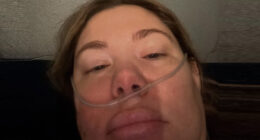Weight loss is a common resolution made by many people every January. While there are various reasons someone might set this goal, there are undeniable health benefits if the person is overweight.
In particular having too much fat in one area of the body could be particularly dangerous. Visceral fat is a type of fat stored deep in the belly, often giving people a potbelly or more of an “apple-shaped” appearance.
A small amount of visceral fat is needed to protect and insulate your organs but having too much is known to significantly increase your risk for conditions such as type 2 diabetes, heart disease and even cancer.
Therefore, if you notice your belly is growing larger than it used to, it might be time to consider making the necessary lifestyle changes for weight loss. Eating a healthy, balanced diet and sticking to a consistent exercise routine is one way to do so.
However, making a simple tweak to what you drink could also help reduce unwanted fat in the body.
Although perhaps not the most exciting drink, there is no denying water is the best choice when it comes to staying well hydrated.
And according to health experts, boosting our daily water intake could also help burn belly fat and protect our vital organs.
However, the idea that water can be used as an alternative to food to quickly “fill you up” is not accurate.
Instead you should be upping your water intake as part of a longer-term lifestyle change to encourage weight loss.
One study, published in the Nutrición Hospitalaria journal in 2019, found that drinking enough water may help you burn more calories and reduce appetite if consumed before a meal.
Overall, this can lower the risk of long-term weight gain.
And speaking to Men’s Health, sports dietitian Kelly Jones said: “Along with well balanced meals and snacks, adequate hydration may help you better listen to your hunger and fullness cues, helping your body reach the weight it is meant to be over time.”
But how much water should we be drinking every day?
The NHS states you should drink six to eight cups of fluid a day – that includes tea, coffee, and a cup of soup.
It says: “The NHS recommends that we drink six to eight glasses of water per day, and the key is to start drinking in the morning and continue to do so regularly throughout the day.
“This doesn’t have to be consumed as plain water and can include lower fat milk and/or lower sugar or sugar free drinks such as low sugar cordials, tea and coffee.”
But replacing sugary drinks for water is one way to help speed up weight loss efforts.
According to the health service, you should also limit fruit juice and smoothies to a maximum of one small glass (150ml) a day and drink with a meal, “as they’re high in sugar”.
If you are not drinking enough fluids you will start to become dehydrated.
Dark and strong smelling urine is a clear sign of dehydration and can be used as a good indicator that we need to drink more.
To lose weight the NHS also advises exercising at least 150 minutes a week and eating five fruits and vegetables a day.










